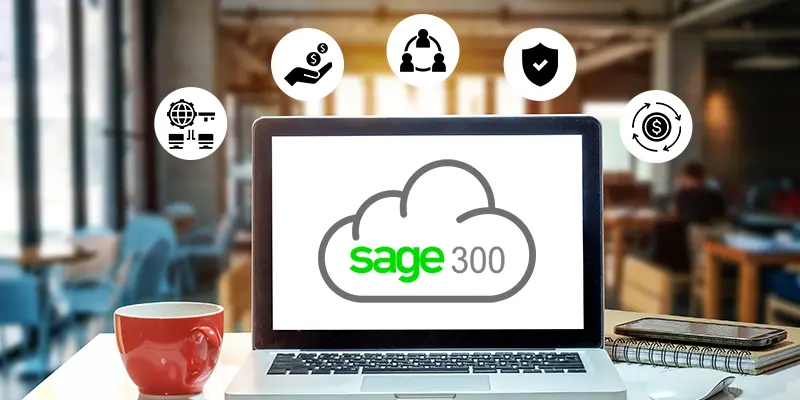
Why You Should Host Sage 300 ERP On The Cloud
Sage 300 ERP, formerly known as Sage ACCPAC, is a software system designed to help SMBs effectively manage their business resources. It is a business management application that lets you manage businesses online with different services and spread at geographical locations. With the ERP suite, the user gets a broad selection of available modules such as payroll, core accounting, e-commerce, finance, distribution, inventory control, and manufacturing.
Sage 300 ERP hosting enables organizations to make the most of it, resulting in smooth business execution. With the help of this unique management software, you can add functionalities to marketing, sales, and customer services.
Having known a brief about Sage 300 software, let us now see the benefits of Sage 300 ERP cloud hosting.
1. Round-the-Clock Remote Access
We always find the latest methods to increase our business productivity so that we can always be one step ahead of our competitors. One non-deniable thing is that no matter how much we put in, we find ourselves short on time. One of the vital benefits that companies gain from hosting Sage 300 on the cloud is having the ability to access their data from anywhere at any given time. When on the cloud, you get easy and instant access to the company’s data even from a remote location across any internet-enabled device. Cloud platforms eliminate the need for physical servers and let you experience on-the-go data accessibility.
2. Cost-effectiveness
With Sage 300 ERP on the cloud, you don’t need to spend upfront capital on the purchase or maintenance of the hardware. Not having to worry about an upfront capital outlay, you experience much ease at work and save a lot. The tariffs for cloud hosting are way more flexible than traditional obsolete methods. Check out our pricing layout for cloud hosting Sage300 ERP. If you are a user, you pay for the server and infrastructure capacity according to your requirement. During the peak season, it easily upgrades or degrades as per requirements
3. Disaster Recovery Solution
It’s inevitable for businesses from all walks of the industry to invest in a robust and sporadic disaster recovery program. However, SMBs consider disaster recovery a challenge due to their disposable budgets and small workforce. So, the Sage 300 cloud system helps SMBs buck up to this trend.
When you host Sage 300 on the cloud, it offers a disaster recovery plan by taking a backup of the data at multiple geographic locations, thus making the data immune to unilateral disasters.
4. Better Collaboration
The value of cloud-based Sage 300 ERP is seen as collaborative working, syncing, and multiple user accessibility. When the employees have anytime and anywhere access to the software, it becomes easy for them to work collaboratively, thus improving workflow and efficiency.
Cloud hosting Sage 300 ERP system provides better collaboration and facilitates virtual work throughout the world’s geography. As well as among multiple clients and users, ultimately reducing the marketing time. Features like real-time updates and better handling of larger files make it a breeze for collaborative and flexible working. Even during the crunching tax season.
5. Enhanced Security
The primary focus is security, which deals with vulnerable data. The cloud’s advanced security features, like scheduled backups, encryption, multi-factor authentication, and a firewall, take you way ahead of the redundant security measures of the on-premise data storage. The cloud-based Sage 300 ERP immunes your data to any atrocities that the hardware faces, be it a virus, theft, or other physical damages.
6. Hardware Elimination
When you host your applications on the cloud, you don’t require to fit local servers to get the work going. The reason is cloud computing, which allows you to access your data through remote servers anytime and anywhere.
As already discussed in the Round-the-clock remote access, the need for physical setups is reduced with cloud computing, resulting in on-the-go data accessibility.
Read this also: A Detailed Guide on Cloud Computing‚ Its Types‚ and How It Works
7. Business Continuity
The cloud-based Sage 300 ERP enables business-critical applications to perform. Even if your organization is facing an issue from the data centers. You can save the most essential business-related information on virtual servers and retrieve it from anywhere at any place.
The least amount of data loss with the quickest information restoration makes cloud-based Sage 300 a worthy application to invest in. One advantage of cloud computing is that you don’t have to deal with business latency now!
Conclusion
Cloud hosting is the way to go if you intend to keep up with the sporadic trend of the rapidly growing industry. Also, read about the changes brought by cloud computing in the business sector. Cloud hosting software like Sage 300 ERP allows you to maintain several currencies and exchange rate schedules and track P/L from currency fluctuations. It is a dynamic yet solid armor to keep in your arsenal. The industry has witnessed Sage being the preferred software of professionals. Hence, you should also take a look at it and use Sage 300 Hosting for enhanced facilities.
FAQs
What is the Difference Between Sage 300 ERP and the Cloud-based Sage 300 ERP
The cloud-based Sage 300 ERP, a virtual server application, offers subscription based pricing i.e. pay-as-yo-go model, and the classic Sage 300 ERP, a desktop-based application, requires buying licenses which can be expensive due to its maintenance cost.
How Much is the Cost of Cloud Hosted Sage 300 ERP
Different sellers offer various pricing plans for cloud hosted Sage 300 ERP. We at Sagenext, offer monthly at $50, half-yearly at $285, and annually at $540.
Does Sage 300 ERP have a Cloud Version
Sage 300 ERP does not have a cloud version. However, you can host it on the cloud-based platform to increase your business productivity.






